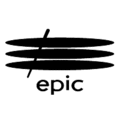Epic Records
| Epic Records | |
|---|---|
 | |
| Parent company |
Sony Music Entertainment a subsidiary of Sony Entertainment Inc. |
| Founded | 1953 |
| Founder | Columbia Records |
| Distributor(s) |
Sony Music Entertainment Legacy Recordings (reissues) |
| Genre | Various |
| Country of origin | United States |
| Location | New York City, New York, U.S. |
| Official website |
|
Epic Records is an American record label owned by Sony Music Entertainment, a subsidiary of Sony Corporation of America, Inc.. Epic was founded predominantly as a jazz and classical music label in 1953. It later expanded its scope to include a more diverse range of musical genres, including pop, R&B, rock and hip hop. The label has released albums by popular acts such as Michael Jackson, Cheap Trick, Shakira,Travis Scott , Celine Dion, ABBA, Anastacia, George Michael, Boston, Dave Clark Five, Gloria Estefan, Pearl Jam, Rage Against the Machine and Sly & the Family Stone.[1]
Along with Columbia and RCA Records, Epic is one of Sony Music Entertainment's three main record labels. Artists signed to Epic as of 2017 include Fiona Apple, Sara Bareilles, Mariah Carey, Keyshia Cole, Future, Fifth Harmony, Jennifer Hudson, Zara Larsson, Jennifer Lopez, Outkast, Ozzy Osbourne, Judas Priest, Busta Rhymes, Rick Ross, Sade, 21 Savage, Travis Scott, DJ Khaled, Meghan Trainor, Camila Cabello and Louis Tomlinson.[2]
History
Beginnings
Epic Records was launched in 1953 by the Columbia Records unit of CBS for the purpose of marketing jazz, pop and classical music that did not fit the theme of its more mainstream Columbia Records label. Initial classical music releases were from Philips Records which distributed Columbia product in Europe.[3] Pop talent on co-owned Okeh Records were transferred to Epic which made Okeh a rhythm and blues label.[4] Epic's bright-yellow, black, and blue logo became a familiar trademark for many jazz and classical releases. This has included such notables as the Berlin Philharmonic, Charles Rosen, the Juilliard String Quartet, Antal Doráti conducting the Hague Philharmonic and George Szell conducting the Cleveland Orchestra.
Expansion of genres and mainstream success
By 1960, the label's musical base had been expanded to include all genres. This was done in part to prevent the roster of Columbia Records (which, at the time, had a reputation for releasing material by more established acts) from being overstuffed with newer artists. Subsequently, Epic became better known for its signing of newer, fledgling acts. By the end of the 1960s, Epic earned its first gold records and had evolved into a formidable hit-making force in rock and roll, R&B and country music. Among its many acts, it included Roy Hamilton, Bobby Vinton, The Dave Clark Five, The Hollies, Tammy Wynette, Donovan, The Yardbirds, Lulu, July, Helen Shapiro and Jeff Beck. Several of the British artists on the Epic roster during the 1960s were the result of CBS's Epic/Okeh units' international distribution deal with EMI; Epic recordings were issued by EMI on the Columbia label.
Epic was involved in a notable "trade" of artists. Graham Nash was signed to Epic because of his membership in The Hollies. When the newly formed Crosby, Stills & Nash wanted to sign with Atlantic Records, Ahmet Ertegün worked out a deal with Clive Davis whereby Richie Furay's new band Poco (having signed with Atlantic due to Furay's contract from being in Buffalo Springfield) would sign with Epic.[5]
Epic's commercial success continued to grow in the 1970s with releases from ABBA in the UK, Boston, Cheap Trick, The Clash, Charlie Daniels, Gabriel, Heart, Heatwave, The Isley Brothers, The Jacksons, George Jones, Labelle, Meat Loaf, Johnny Nash, Ted Nugent, REO Speedwagon, Minnie Riperton, Pegasus, Charlie Rich, Sly & the Family Stone, Steve Vai, and Edgar Winter. Also contributing to the label's success was its distribution of Philadelphia International Records, which produced additional hit records by acts such as The Three Degrees and McFadden and Whitehead.[6]
Corporate structure: CBS, Sony Corp purchase, merger with BMG, creation of Sony Music Entertainment
During the 1960s, Epic oversaw the smaller subsidiary CBS labels including Okeh Records and Date Records. In 1968, Epic recordings began being distributed in the UK by CBS after the distribution deal with EMI expired that year;[7] Epic itself launched in England around 1971.[8]
Sony Corporation bought CBS Records in 1987, and the company was renamed Sony Music in 1991. It began splitting European operations into two separate labels, Epic and Columbia, in 1992, and in 1997, Sony Music's Australia and New Zealand followed suit. [9]
In 2004, Sony merged with music distributor, BMG, bringing Arista Records, Columbia Records, Epic Records, J Records, Jive Records, RCA Records and Zomba to one parent company, Sony BMG.[10] In 2008, Sony bought out BMG for $1.2 billion, bringing all affiliated labels together as Sony Music Entertainment International, SMEI. The merger was approved by the EU in 2009.[11]
1980s - 2010: Michael Jackson, Culture Club, Sade, Celine Dion, Epic Soundtrax, Pearl Jam, Oasis
Epic's 1980s and 1990s mainstream success were fueled by its signing and releasing of albums by notable acts such as Michael Jackson, Teena Marie, Shakin' Stevens, Culture Club, Gloria Estefan and the Miami Sound Machine, Adam Ant, Living Colour, Incubus, Dead or Alive, Europe, Cyndi Lauper, Ozzy Osbourne, Korn, Pearl Jam, Sade, Luther Vandross, Stevie Ray Vaughan, Rage Against the Machine, Céline Dion, and Oasis, among others. The label's greatest financial payoff came via the release Thriller, the 1982 album by Michael Jackson, which went on to achieve approximately 51–65 million in worldwide sales, becoming the biggest selling album in history.[12][13][14]
Epic Soundtrax was founded in 1992. It was central to Epic's 1990s success, with 11 releases cumulatively selling more than 40 million records over a three-year period. Notable releases included soundtrack albums for Honeymoon in Vegas, Singles, Sleepless in Seattle, Forrest Gump, Philadelphia, and Judgement Night.[15][16]
2011 to present: L.A. Reid, DJ Khaled, Meghan Trainor, Jennifer Lopez, Keyshia Cole, Sylvia Rhone
In July 2011, L.A. Reid became the CEO of Epic Records, signing artists such as TLC, Toni Braxton, Cher Lloyd , Avril Lavigne, Outkast, Future, Yo Gotti, Ciara, Meghan Trainor, DJ Khaled and Travis Scott.[17][18] Epic also signed the winners of The X Factor during the seasons that Reid appeared on the show.[19]
In 2013, Sylvia Rhone, former president of Universal Motown, launched the imprint Vested In Culture through Epic Records. A year later, she was named president of the label.[20][21][22]
In November 2014, Mosley Music Group created a joint venture with Sony Music, with marketing, publicity, distribution and overall label services provided by Epic. The joint venture was created due to Timbaland's previous collaboration with L.A. Reid on Michael Jackson's posthumous album, Xscape. Previously operated by Interscope, most of MMG's roster moved to Epic.[23]
In 2015, Mariah Carey left her former label, Def Jam Recordings, to reunite with Reid at Epic. He had worked with Carey at Def Jam under The Island Def Jam Music Group in 2004.[24][25] That same month, it was announced that R&B group Jodeci had signed to the label and planned to release their first studio album in 20 years.[26][27]
Wondaland Records, singer Janelle Monáe's imprint, entered into a joint venture with Epic in 2015.[28] Acts on Wondaland include Jidenna, St. Beauty, Deep Cotton and Roman GianArthur.[29]
In 2016, Jennifer Lopez returned to Sony Music, six years after leaving in favor of Island Def Jam and Capitol Records. Lopez's multi-album deal reunited her with Reid, whom she signed with at Island Def Jam in 2010.[30] In January 2017, 21 Savage signed to Epic .[31]
In May 2017 Reid was fired for sexual harassment. Rhone subsequently served as the label's interim chief.[32]
Formerly affiliated labels
- 550 Music (1993–2000)
- Blue Sky (1974–1982)
- Caribou Records (1976–1985)
- Cold Chillin' Records (1993–1999)
- Date Records (1960s)
- Epic Records Nashville (? - May 2006)
- Epic Soundtrax (1992–1997)
- Epic Street (1993–1998)
- Cleveland International Records (1976–1983)
- CTI Records (1980)
- Tuff City Records (1983–1984)
- Hidden Beach Records (1998–2007)
- Glacial Pace (mid-1990s)
- Invictus Records (1973–1976)
- Jet Records (1978–1983)
- Kirshner Records (1974–1983)
- MJJ Music (1988-2001)
- Nemperor Records (1977–1990)
- Ode Records (1967–1969, 1976–1979)
- OKeh Records (1965–1970, 1994–2000)
- Pasha Records (1979–1990)
- Philadelphia International Records (1971–1984)
- Portrait Records (1976–1992)
- Ruthless Records (1990, 1999–2009, defunct)
- Scotti Brothers (1979–1988)
- SOLAR Records (1989–1993)
- T-Neck Records (1972–1984)
- Tabu Records (1978–1991)
- The WORK Group (1994–1999)
- Virgin Records (1976–1978), (1982–1986)
Epic Records artists
Logos
Unlike sister label Columbia, Epic went through five different logos since its launch. Some logos were temporarily revived for period reissues. The years shown below list the time served as the label's primary logo.
 Classic radial sound sunburst logo 1953-1973, 1998-2005
Classic radial sound sunburst logo 1953-1973, 1998-2005 Big "E" logo, 1973 to 1978
Big "E" logo, 1973 to 1978 Script logo, late 1978-1991, 2005-2011, revived in 2015 and on the website since 2015. Still used on Epic UK since 2005.
Script logo, late 1978-1991, 2005-2011, revived in 2015 and on the website since 2015. Still used on Epic UK since 2005. Stacked-record logo, 1991-1998
Stacked-record logo, 1991-1998 Red print logo, 2011-2015
Red print logo, 2011-2015
See also
- List of record labels
- Epic/Sony Records (Japanese branch of Epic Records)
- RCA Records
- Columbia Records
References
- ↑ Halperin, Shirley (November 17, 2010). "Who Destroyed Epic Records?". Billboard. Retrieved 24 July 2015.
- ↑ "Epic Records - Artists". epicrecords.com. Retrieved January 27, 2017.
- ↑ Billboard - Google Books. Books.google.com (1953-09-19). Retrieved on 2013-07-16.
- ↑ Billboard - Google Books. Books.google.com. 1953-09-19. Retrieved 2011-12-23.
- ↑ Robert Greenfield. The Last Sultan: The Life and Times of Ahmet Ertegun. Simon and Schuster. 2011. 202-3.
- ↑ "Epic Records timeline". World History Project. Retrieved 2017-07-20.
- ↑ Billboard - Google Books. Books.google.com. 1968-05-11. Retrieved 2011-12-23.
- ↑ EPIC
- ↑ Barker, Michael (July 25, 1992). "Sony Germany Music Splitting Marketing Division". Billboard. Retrieved 16 June 2017.
- ↑ Phillips, Chuck (July 20, 2004). "Merger of Sony, BMG Music Labels Wins Endorsement of European Commission". Los Angeles Times. Retrieved 16 June 2017.
- ↑ Wray, Richard (August 8, 2009). "Sony Buys Bertelsmann Out of Sony BMG". The Guardian. Retrieved 16 June 2017.
- ↑ "Arts and Media/Pop Stars/Best-selling Album". Web.archive.org. 2006-05-17. Archived from the original on 2006-05-17. Retrieved 2014-05-20.
- ↑ "Michael Jackson, pop music legend, dead at 50". CNN. 25 June 2009.
- ↑ The Baby Boomer Encyclopedia - Marty Gitlin - Google Books. Books.google.com.pe. Retrieved 2014-05-20.
- ↑ Lei, Richard (September 11, 1994). "IN HOLLYWOOD: A SONIC BOOM". Washington Post. Retrieved 7 August 2015.
- ↑ Rosen, Craig (July 11, 1992). "There's Sizzle in Summer Soundtracks". Billboard. Retrieved 26 July 2015.
- ↑ "Outkast, Ciara Headed for L.A. Reid's Epic Records, Sources Say". Billboard.biz. 2011-09-15. Retrieved 2011-12-23.
- ↑ "92.5 THE BEAT Montreal's Best Music Variety Radio Station". 925thebeat.ca. Archived from the original on 2011-11-12. Retrieved 2011-12-23.
- ↑ 'X Factor' Has Glitzy Premiere, Complete With Simon-Paula Bickering. Billboard (2011-09-15). Retrieved on 2013-07-16.
- ↑ "It's Official: Sylvia Rhone to Run New Label Through Epic | Billboard". Billboard.biz. Retrieved 2014-05-20.
- ↑ Mitchell, Gail (February 5, 2013). "Exclusive: Sylvia Rhone Talks New Label Vested in Culture". Billboard. Retrieved 24 June 2015.
- ↑ Mitchell, Gail (19 March 2014). "Sylvia Rhone Appointed President of Epic Records". The Hollywood Reporter.
- ↑ "Timbaland’s Mosley Music Group Is Joining Forces With L.A. Reid (Thanks to Michael Jackson)". Retrieved 1 July 2016.
- ↑ "Mariah Carey signs with Epic Records". thehonestyhour.com. January 30, 2015. Archived from the original on January 31, 2015. Retrieved January 30, 2015.
- ↑ "The Inside Story of How Mariah Carey and L.A. Reid Reunited (at a Fraction of Her Former $80 Million Deal)". Shirley Halperin and Andrew Hampp. January 30, 2015.
- ↑ "Jodeci Debuts New Single "Every Moment"". epicrecords.com. Epic Records. Archived from the original on February 6, 2015. Retrieved January 31, 2015.
- ↑ "Jodeci Inks Deal With Epic Records For Comeback Album". singersroom.com. Singers Room. Retrieved January 31, 2015.
- ↑ "Janelle Monae inks Joint Venture with Epic Records". theurbandaily.com. 2015. Retrieved 2 March 2015.
- ↑ "Janelle Monae's Wondaland Records And Epic Records Launch Landmark Joint Venture Partnership". prnewswire.com. 2015. Retrieved 2 March 2015.
- ↑ Billboard Staff (2 March 2016). "Jennifer Lopez Signs New Deal With Epic Records". Billboard. United States. Prometheus Global Media. Archived from the original on 3 March 2016. Retrieved March 2, 2016.
- ↑ http://www.thefader.com/2017/01/18/21-savage-epic-drake-deeper-than-rap
- ↑ Karp, Hannah (May 15, 2017). "L.A. Reid's Epic Records Exit Followed Allegations by Female Staffer". Billboard. Retrieved 16 May 2017.
External links
- Official website
- Sony Music, Parent Company of Epic
- Epic Records album discography, 1962-1970